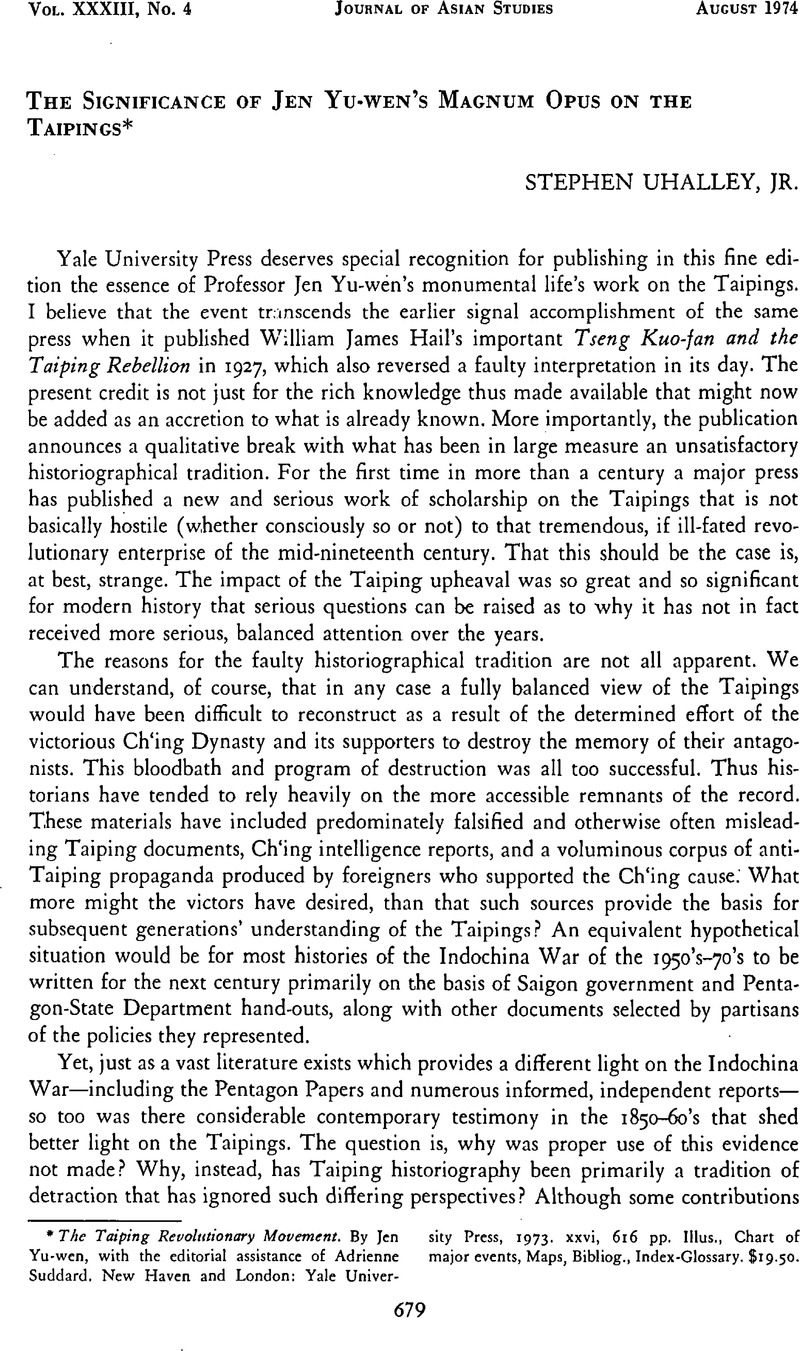Published online by Cambridge University Press: 23 March 2011

1 Meadows to Lord Russell, No. 3, Shanghai, February 19, 1861, “Papers relating to the Rebellion in China and Trade in the Yang-tze-kiang River, 1862, Parliamentary Papers (Blue Books), XI, pp. 3–6.
2 C. A. Montalto de Jesus Historic Shanghai, (1909), p. 115.
3 The quoted words are those of John King Fairbank. Interestingly, this favorable appraisal by Professor Fairbank includes the further observations that Meadows, “The philosopher in action proved irascible and hard to deal with,” and that his “con-sular career was marked by unusual acrimony even for the treaty ports….” But Fairbank docs not explain, nor even hint as to why this was the case. The reason, of course, was that Meadows' sense of justice would not allow him to agree to the anti-Taiping policy being, evolved. See Fairbank, John K., “Meadows on China: A Centennial Review,” Far Eastern Quarterly, XIV (May 1955), 365–371.CrossRefGoogle Scholar See also my brief introduction to Meadows' Desultory Notes on the Government and People of China (London, 1847, New York, Praeger Publishers reprint, 1970), v-ix.Google Scholar
4 W. A. P. Martin, Letters I and II to the Honorable Caleb Cushing, in North China Herald, Nos. 359 and 360, June 13 and 20, 1857 respectively.
5 Martin, W. A. P., A Cycle of Cathay (New York, 1900), p. 14.Google Scholar
6 Frederick Bruce to Lord Russell, No. 72, Shanghai, September 4, i860, Enclosure 5, BB, XI, 137–144.
7 Harvey to Hammond, No. 3, Ningpo, March 20, 1862, Enclosure 4, “Further Papers …,” BB. 12–16.
8 Williams, S. Wells, The Middle Kingdom, Vol. II (New York, Scribners, 1883), p. 610.Google Scholar
9 See Michael, Franz, The Taiping Rebellion: History and Documents, Vols. I, II, III, Seattle: University of Washington Press, 1966, 1971. Part V of the first, narrative volume is especially useful.Google Scholar
10 For further recent work on the Taiping's relations with the foreign powers see my various pieces (none of which is listed in the present work's bibliography): “A New Look at the Diplomatic Missions of 1853–54 to Taiping-held Nanking,” Chung Chi Journal, VI, No. 2 (May 1967), 171–190;Google Scholar “Introduction” to Oliphant, Laurence, Narrative of the Earl of Elgin's Mission to China and Japan in the Years 1857, 1858, 1859 (London, 1860, New York, Praeger Publishers reprint, 1969),Google Scholar v–ix; “Introduction” to Lindley, A. F. (Lin-le), Ti-ping Tien-Kwoh: The History of the Ti-ping Revolution (London, 1866, New York, Praeger Publishers reprint, 1969),Google Scholar v-ix; “Lord Elgin and the Taipings,” Journal of the Hong Kong Branch of the Royal Asiatic Society, Vol. X (1970), 24–35;Google Scholar and “The Taipings at Ningpo,” Ibid., Vol. XI (1971). 17–32. Sec also my The Foreign Relations of the Taiping Revolution (Ph.D. dissertation, U. C., Berkeley), Ann Arbor: University Microfilms, 1967,Google Scholar the revised manuscript of which will be published eventually. These writings collectively make a strong case in demonstrating wiih abundant evidence that foreign involvement in the Taiping Revolution played a crucial, and not just an incidental or supplemental role in the suppression of the movement. Ssu-yü's, TengThe Taiping Rebellion and the Western Powers (Oxford, 1971). is helpful in considering the peripheral Russian role.Google Scholar
11 Good examples are the exchange between Nathan, Andrew and Esherick, Joseph in the Bulletin of Concerned Asian Scholars, Vol. 4, No. 4 (December 1972), 2–16,Google Scholar and further comments by Fairbank, John, Esherick, Joseph and B., MarilynYoung in the same publication, Vol. 5, No. 2 (September 1973). 32–35.Google Scholar
12 For a direct confrontation of the question whether the Taipings be regarded as a revolution or a rebellion see my “The Taiping Movement: A Proposal for a Proper Designation,” in Thompson, Laurence G., ed., Studia Asiatica: Essays in Asian Studies in Felicitation of the Seventy-Fifth Anniversary of Professor Ch'cn Shou-yi (Taipei: Association for Asian Studies, probably 1974).Google Scholar